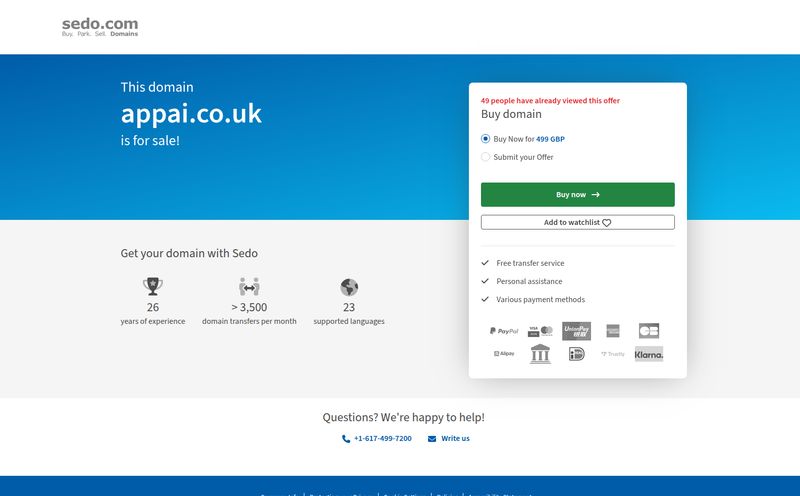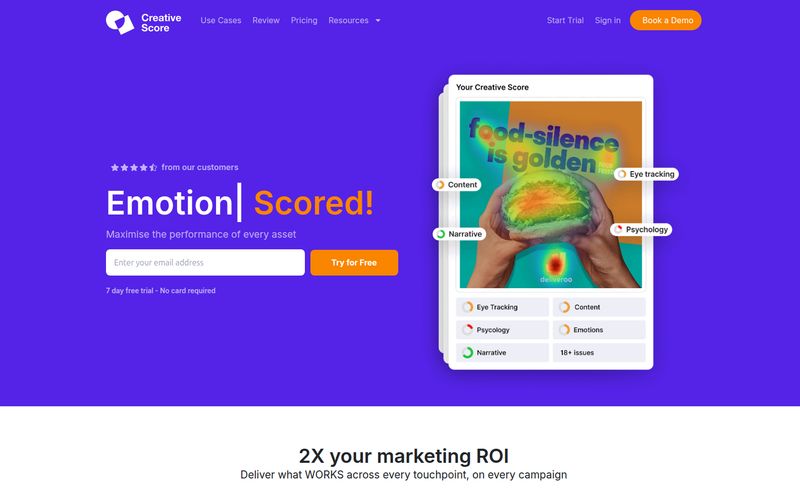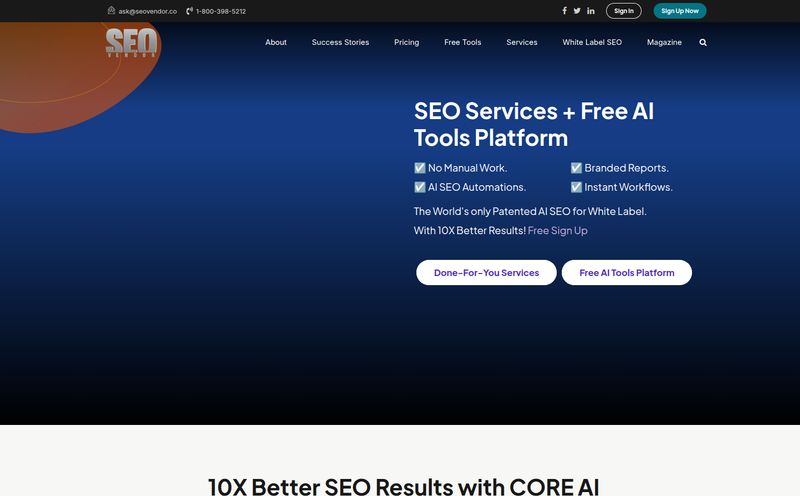If you're in the SEO or content game, you know the grind. The endless cycle of keyword research, outlining, writing, editing, and publishing. It's a hamster wheel that just keeps spinning faster. For years, we’ve been told “content is king,” and we’ve dutifully churned out blog post after blog post, hoping to catch the Google algorithm's eye. But what if you need to create content not just for one keyword, but for hundreds? Or thousands?
That’s where the almost mythical concept of Programmatic SEO (pSEO) enters the chat. The idea of creating thousands of unique, optimized pages automatically. It's the kind of thing you’d hear about Zapier or DoorDash doing, and you'd just nod along thinking, “Cool, but I don’t have a team of 50 developers.” I've been in this game for a while, and for the longest time, pSEO felt like one of those exclusive clubs with a secret handshake.
Then I stumbled across SEOmatic. The promise was bold: automate and scale your content with pSEO and AI, no coding required. My inner skeptic immediately raised an eyebrow. My curiosity, however, won out. So, I went down the rabbit hole, and what I found was… well, it’s interesting enough that I had to write this down.
So, What Exactly is SEOmatic? (And Why Should You Care?)
Think of SEOmatic as a highly efficient content factory. You're the factory manager, but you don't need to hire a massive crew. Instead, you provide the blueprint (a template) and the raw materials (your data), and the factory gets to work, assembling hundreds or even thousands of unique web pages for you. It's designed to take the brute force labor out of scaling content marketing.
The core idea is simple but powerful. Imagine you're a real estate agent who wants a page for every single suburb you service. Instead of manually creating 200 pages that say “Best Agent in [Suburb Name],” you create one template. You then feed it a spreadsheet with 200 suburb names, maybe some population data, and a few local landmarks. SEOmatic takes that data, plugs it into your template, and poof—you have 200 unique, locally-optimized pages. This isn't just about swapping out a city name; the integrated AI helps generate unique paragraphs for each variation, making them genuinely distinct.

Visit SEOmatic
The Magic Behind the Curtain: How It Actually Works
The beauty of this platform is its simplicity. I'm not a developer, and the thought of messing with APIs usually gives me a mild headache. SEOmatic seems to get that. The whole process is boiled down to three main steps:
- Connect Your Data: This is your starting point. You can upload a simple CSV file (think Google Sheets or Excel), connect to an Airtable base, or even pull data directly from an API. This is the “raw material” for your content factory.
- Design Your Page Template: This is where you build the blueprint. You create a single page layout, deciding where the headlines, text, images, and other elements go. You use special variables that correspond to the columns in your data file. For example, you might place `{{City_Name}}` in your H1 tag.
- Publish and Go: Once your template is ready, you hit the publish button. SEOmatic generates all the unique pages based on your data and pushes them directly to your CMS, like WordPress or Webflow. It’s surprisingly fast.
Now, a word of caution from someone who's learned it the hard way: your output is only as good as your input. If your CSV file is a mess of inconsistent formatting and typos, you’re just going to generate a mess at scale. Take the time to clean and organize your data. Trust me on this one.
The Core Features That Actually Matter
A lot of SaaS tools love to throw a laundry list of features at you. But let's cut through the noise. Here’s what I think really makes SEOmatic tick.
Programmatic SEO and Bulk Page Creation
This is the main event. The ability to generate pages at scale is the reason you’d consider a tool like this. It's a game-changer for service-area businesses, directories, affiliate sites, and e-commerce stores with tons of similar products. Think about the possibilities: “Best Emergency Plumber in [City],” “Compare [Product A] vs [Product B],” “[Service] for [Industry]”—the combinations are endless. You're basically creating a massive web of relevant content that captures long-tail traffic you could never target manually.
The AI Content Generation Engine
This is where it gets really interesting. SEOmatic doesn’t just insert your data into a template. It uses AI to write unique content for each generated page. This helps you avoid the dreaded duplicate content penalty that old-school, find-and-replace tools used to create. It’s not perfect—let's be clear. I've always felt AI is a phenomenal assistant, but a terrible boss. You still need to provide the strategic direction and do a final review. But for generating unique descriptions, FAQs, or introductory paragraphs for 500 service pages? It’s an incredible time saver.
Geo-Targeting and Landing Page Personalization
This is a seriously powerful application. For local SEO, you can create hyper-specific pages that speak directly to a local audience. But it also extends to PPC. Instead of sending all your ad traffic to one generic landing page, you can create hundreds of variants that perfectly match the ad copy and keyword. Imagine someone searches for “divorce lawyer for men in Brooklyn.” Your ad can lead them to a page specifically titled “A Divorce Lawyer for Men in Brooklyn, NY” with relevant content. The potential for boosting conversion rates and Quality Scores is huge.
Who Is This Tool Actually For?
This isn't a tool for the casual blogger writing one article a week. This is a power tool for people who need to create content at scale. I see it being a perfect fit for:
- SEO Agencies: Imagine being able to roll out a comprehensive local SEO strategy for a client in a single afternoon.
- Service-Area Businesses: Plumbers, electricians, lawyers, cleaners, real estate agents… anyone serving multiple locations.
- Affiliate Marketers: Building out massive niche sites that compare products or services.
- In-House Marketing Teams: Especially those in SaaS or marketplaces who need to create pages for every feature, integration, or alternative.
The testimonials on their site echo this. Tom Baker, a marketing lead, put it well:
“Great programmatic SEO platform out there! If you want to get started with creating thousands of pages for several purposes this is the best option.”
That hits the nail on the head. It's for when you move from thinking in terms of single pages to thinking in terms of entire content systems.
Let's Talk Money: SEOmatic Pricing Breakdown
Alright, the all-important question: what’s this going to cost? The pricing is pretty straightforward and tiered based on volume. Here's a quick look at their annual plans:
| Plan | Price (Billed Yearly) | Key Features |
|---|---|---|
| Basic | $41 /mo | 50k AI words/mo, publish up to 500 pages/mo. |
| Premium | $124 /mo | 150k AI words/mo, publish up to 5k pages/mo, 3 team seats. |
| Agency | $249 /mo | 300k AI words/mo, publish up to 10k pages/mo, 5 team seats. |
Honestly, the value proposition here is pretty compelling. The Basic plan at $41/month lets you create 500 pages. How much would it cost to have a freelance writer create 500 unique pages? I’ll wait. Even if the AI content needs a 15-20% human touch-up, the ROI is astronomical. The Premium and Agency plans are for when you’re really ready to step on the gas.
The Good, The Bad, and The Realistic
No tool is perfect. After playing around and thinking through the workflow, here’s my honest breakdown.
The Things I Really Like
The speed and scalability are obviously the main draws. The 'no-code' aspect is genuinely true; the interface is clean and you dont need to be a tech wizard to figure it out. It democratizes programmatic SEO, taking it out of the hands of just giant corporations. That feeling of setting up a campaign and watching hundreds of optimized pages get created is, I admit, pretty magical.
A Few Things to Keep in Mind
This is not a “set it and forget it” magic bullet. First, as I mentioned, your data source needs to be well-planned and clean. Second, the AI is a tool, not a strategist. You still need to do your keyword research and understand your audience. The AI won't invent a brilliant content strategy for you. It will, however, execute your brilliant strategy at a scale you couldn't imagine. Finally, there's a learning curve to thinking programmatically. It's a shift from 'what should this one page be about?' to 'what is the system of pages I need to build?'
Frequently Asked Questions about SEOmatic
Can I preview the available templates before purchasing?
SEOmatic is more of a builder than a library. You don't pick from pre-made templates; you build your own unique template that fits your data and your brand. This offers more flexibility than a rigid template system.
What languages and tones does the AI support?
The AI writer supports a wide variety of languages and can adapt its tone—from professional to witty—based on your instructions within the template, giving you control over the final voice of the content.
Do SEOmatic pages get indexed on Google faster?
There's no special trick to get indexed faster. Indexing speed still depends on standard SEO factors: the quality of your content, your site's authority, and your sitemap. However, by creating a large volume of high-quality, interlinked pages, you give Google a lot more to crawl and index, which can certainly speed up your site's overall visibility.
Is this just for SEO, or can I use it for PPC landing pages?
Absolutely. It's fantastic for PPC. Creating highly specific landing pages that match your ad groups and keywords can significantly improve your ad relevance and conversion rates. It's one of its most powerful use cases.
Do I need to know how to code to use this?
Nope. That's one of its biggest selling points. The entire interface is visual and user-friendly. If you can handle a spreadsheet and a standard CMS like WordPress, you can handle SEOmatic.
Is this AI content going to get me penalized by Google?
This is the big question on everyone's mind. Google's official stance (as of my last check with folks like John Mueller) is that they penalize low-quality, spammy content, not necessarily AI-generated content. The key is to create content that is helpful to the user. If you use SEOmatic to generate thousands of useful, unique, and relevant pages, you're aligned with Google's goals. If you use it to create spammy gibberish, you'll run into trouble.
Final Thoughts: Is SEOmatic a Game Changer?
After spending some quality time with it, I can say that SEOmatic is a genuinely impressive piece of kit. It’s a force multiplier. It won’t replace the need for smart SEO strategy, but it will allow you to execute that strategy on a scale that was previously unimaginable for most of us. It turns the daunting task of creating hundreds of pages into a manageable, even enjoyable, process.
Is it a game changer? I think so. It represents a shift in how we approach content creation for certain types of campaigns. It’s not about replacing human creativity but augmenting it, freeing us up from the repetitive tasks so we can focus on the bigger picture. If you're an agency or a business that needs to scale content, I believe SEOmatic isn't just worth a look; it might just become the most valuable tool in your arsenal.



